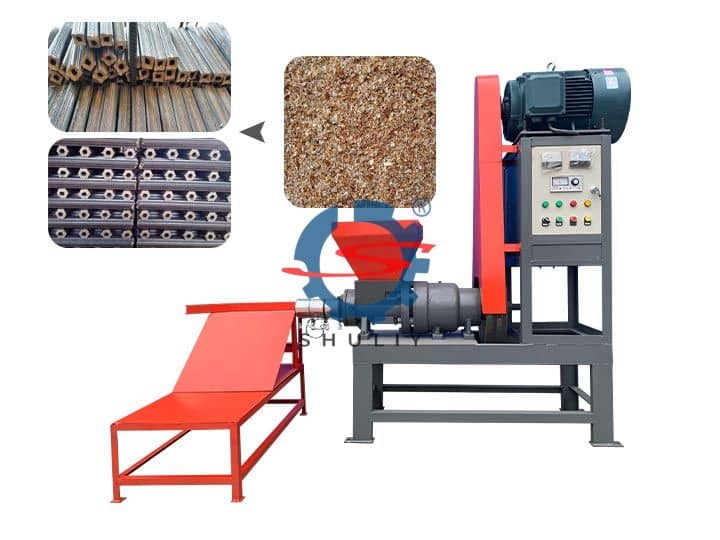Benefits and Uses of Biomass Briquette Machine
Biomass briquette machine has emerged as a game-changer in the realm of sustainable energy production. These innovative devices efficiently convert agricultural and forestry waste into high-density briquettes, offering a cleaner and greener alternative to traditional fuels. In this article, we will delve into the working principle, benefits, and applications of biomass briquette machines, shedding light on their role in promoting environmental sustainability and energy independence.

Working Principle of Biomass Briquette Machine
Biomass briquette machine employs a simple yet effective working principle. These machines compress biomass materials, such as sawdust, wood chips, or agricultural residues, under high pressure and temperature. The natural binder, lignin, present in biomass softens and binds the particles together, resulting in the formation of dense briquettes. This compression process not only increases the energy density of the briquettes but also enhances their combustion efficiency, making them a valuable source of renewable energy.
Benefits of Biomass Briquette Machine
Utilizing biomass briquette machines offers a plethora of advantages. Firstly, it reduces the dependence on fossil fuels, thereby mitigating greenhouse gas emissions and combating climate change. Secondly, biomass briquettes have a higher calorific value, ensuring greater heat generation for cooking, heating, and industrial processes. Moreover, these briquettes possess lower moisture content, making them easy to handle, store, and transport. Additionally, the production of biomass briquettes promotes waste management by utilizing agricultural and forestry residues, thereby reducing environmental pollution and deforestation.
Raw Materials for Biomass Briquettes
Raw materials play a crucial role in biomass briquette production. Various types of biomass materials can be utilized, including sawdust, wood chips, agricultural residues, and even energy crops. The selection of raw materials depends on factors such as availability, cost, and suitability for briquetting. It is essential to ensure that the raw materials are properly prepared, such as reducing the particle size and controlling moisture content. Optimal moisture levels ensure efficient briquette formation and improve the overall quality of the end product. Proper preparation and selection of raw materials are key factors in maximizing the efficiency and effectiveness of biomass briquette machines.
Applications of Biomass Briquettes
Biomass briquettes find versatile applications across various sectors. In households, they serve as an efficient and eco-friendly alternative to firewood, providing clean cooking and heating solutions. Industries can utilize biomass briquettes for steam generation, thermal applications, and electricity production. Moreover, these briquettes can be used as a replacement for coal in power plants, reducing carbon emissions. The agricultural sector can benefit from using briquettes for drying crops and providing heat for greenhouses, thus enhancing productivity and energy efficiency.
Economic and Environmental Impact
The adoption of biomass briquette machine brings several economic and environmental benefits. By utilizing abundant biomass waste, countries can reduce their dependence on costly fuel imports, leading to energy cost savings and increased energy independence. Furthermore, the production and use of biomass briquettes contribute to job creation in rural areas, stimulating local economies. From an environmental standpoint, biomass briquettes offer a carbon-neutral energy source, effectively reducing greenhouse gas emissions and combating climate change. Additionally, the utilization of agricultural waste reduces waste disposal problems and helps preserve natural resources.
Conclusion
Biomass briquette machine provides a sustainable and eco-friendly solution to the global energy crisis. By harnessing the power of agricultural and forestry waste, these machines offer an efficient method of converting biomass into high-density briquettes. With numerous advantages, including reduced carbon emissions, enhanced energy efficiency, and waste management benefits, biomass briquettes are proving to be a viable alternative to conventional fuels. Embracing biomass briquette technology not only promotes sustainable energy practices but also contributes to a cleaner and greener future.
